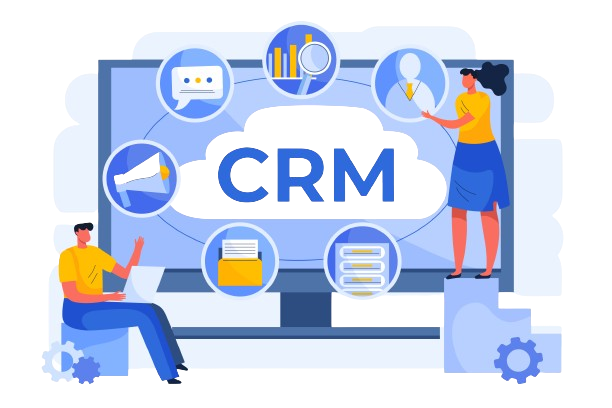
It’s that time of the year again – time to think about where your business is going in 2024. Before you dive into new plans and projects, we have a suggestion that can make a big difference: organize your CRM Software.
Your CRM is like the brain of your business, storing important information about your customers and helping you make smart decisions. When it’s well-organized, it can take your business strategies to a whole new level.
What if all your customer information was neatly sorted and easy to find whenever you needed it? That’s the power of a well-organized CRM. So, before you get too busy with your 2024 goals, take some time to review and organize your CRM.
In this blog, we’ll break down why it’s so important and give you practical tips to make sure your CRM is working at its best. Let’s kick off the year with a strong and organized CRM that sets you up for success in 2024 and beyond!
The Importance of a Well-Organized CRM

The significance of maintaining an orderly CRM cannot be overstated, as it serves as the nerve center for all customer-related interactions and transactions. Here’s why having a well-organized CRM is crucial for achieving and sustaining business success.
- Seamless Access to Critical Customer Data: An organized CRM ensures that essential customer data, including contact information, purchase history, and communication records, is readily available and easy to locate. This accessibility eliminates the need for employees to sift through disparate sources, enabling them to retrieve crucial information promptly.
- Enhanced Customer Relationship Management: A well-maintained CRM facilitates stronger and more personalized interactions with customers. By having a comprehensive view of customer preferences, past interactions, and feedback, businesses can tailor their communication and offerings to meet individual needs, fostering long-term customer loyalty.
- Streamlined Workflows and Increased Efficiency: Organization within a CRM promotes streamlined workflows. With clearly defined processes and categorized data, teams can work more efficiently, reducing the time spent on manual data searches and administrative tasks. This efficiency translates into increased productivity and allows employees to focus on value-adding activities.
- Informed and Timely Decision-Making: Decision-making is a cornerstone of business success, and an organized CRM system plays a pivotal role in this process. By consolidating and presenting relevant data coherently, a well-organized CRM empowers decision-makers with the insights needed to make informed and timely choices. This, in turn, contributes to strategic alignment and goal attainment.
- Improved Collaboration Across Teams: A centralized and organized CRM promotes collaboration among different departments within an organization. Sales, marketing, and customer support teams can seamlessly share information, fostering a holistic understanding of customer interactions and needs. This cross-functional collaboration enhances the overall customer experience.
- Data Accuracy and Consistency: An organized CRM helps maintain data accuracy and consistency. Duplicate records, errors, and outdated information are minimized, ensuring that the data used for decision-making is reliable. This not only prevents costly mistakes but also instills confidence in the accuracy of the information at hand.
From providing a 360-degree view of customer relationships to enabling agile decision-making processes, the importance of a well-maintained CRM cannot be overlooked. As businesses gear up for the challenges and opportunities of 2024, investing time and resources into organizing their CRM will undoubtedly lay the groundwork for sustained success.
Tangible Benefits of CRM Organization

(I) Streamlining Customer Data for Quick Access and Analysis
A well-organized CRM ensures that all customer information, from contact details to transaction history, is neatly cataloged and readily available. This streamlining not only saves precious time but also enhances the efficiency of your team.
- Quick Retrieval of Information: Imagine a scenario where your sales team can swiftly pull up a customer’s purchase history or support interactions during a conversation. With an organized CRM, this becomes a reality. Streamlining customer data means no more sifting through scattered files or searching multiple databases. Every piece of relevant information is just a few clicks away.
- Personalized Customer Interactions: Armed with instant access to customer preferences and past interactions, your team can personalize their approach. Whether it’s tailoring marketing campaigns, offering targeted promotions, or addressing specific concerns, a well-organized CRM empowers your team to provide a more personalized and memorable customer experience.
- Data-Driven Decision Making: With streamlined customer data, businesses can make informed decisions based on real-time insights. Analyzing patterns, identifying trends, and forecasting future needs become more accurate when your CRM is organized. This, in turn, contributes to strategic planning and a competitive edge in the market.
(II) Improving Communication and Collaboration Within the Team
Effective communication and collaboration are the cornerstones of a successful business. An organized CRM plays a pivotal role in fostering these essential elements, bringing teams together, and ensuring everyone is on the same page.
- Centralized Information Hub: Instead of relying on scattered email threads or individual notes, a well-organized CRM serves as a centralized hub for all customer-related communications. Every team member can access up-to-date information, reducing the chances of miscommunication or conflicting messages.
- Real-Time Updates and Notifications: CRM systems often come equipped with features that provide real-time updates and notifications. This means that team members can be instantly informed about any changes or updates related to a customer account. Whether it’s a new lead, a recent purchase, or a customer inquiry, everyone stays in the loop.
- Enhanced Collaboration on Projects: A collaborative CRM allows teams from different departments to work together seamlessly. Sales, marketing, and customer support teams can share valuable insights, coordinate strategies, and ensure a consistent customer experience. This synergy not only improves efficiency but also fosters a sense of unity among team members.
It’s about empowering your team with the tools they need to deliver exceptional customer experiences and work together towards the common goal of business success in 2024 and beyond.
Pitfalls of Neglecting CRM Organization

As we explore the pitfalls of overlooking CRM organization, it becomes evident that disorganized customer information poses substantial risks and can significantly impact customer relationships and satisfaction.
- Data Inaccuracy and Duplication: One of the immediate risks associated with a disorganized CRM is the prevalence of inaccurate and duplicated data. When customer information is scattered across various unstructured databases, it becomes challenging to maintain data integrity. Duplicate entries can lead to confusion, as different departments may rely on conflicting information, ultimately affecting the quality of customer interactions.
- Communication Breakdowns: A disorganized CRM often results in communication breakdowns within the organization. Inaccurate or incomplete customer data can lead to misinformed decision-making, affecting the way teams collaborate and coordinate efforts. This breakdown in communication has a direct impact on the ability to provide seamless customer experiences, as teams may struggle to stay on the same page regarding customer preferences, history, and interactions.
- Customer Frustration and Dissatisfaction: Disorganized customer information inevitably leads to a subpar customer experience. Imagine a scenario where a customer has to repeat their information multiple times or receives conflicting messages from different departments. Such experiences contribute to customer frustration and dissatisfaction. In an era where customer loyalty is paramount, businesses cannot afford to overlook the negative impact disorganization can have on the customer experience.
- Missed Opportunities and Revenue Loss: A disorganized CRM system may result in missed business opportunities. When customer information is not readily available or is inaccurate, businesses may fail to identify upsell or cross-sell opportunities. Additionally, targeted marketing efforts become less effective, as businesses struggle to tailor their strategies based on customer insights. Ultimately, this lack of targeted engagement can lead to revenue loss and hinder the overall growth of the business.
- Security and Compliance Risks: Neglecting CRM organization also poses security and compliance risks. When customer data is not properly organized and secured, businesses run the risk of data breaches and non-compliance with privacy regulations. This not only jeopardizes the trust customers place in the organization but can also result in legal consequences and financial penalties.
Your neglect can extend beyond mere inconvenience. They can directly impact the core of your business – your relationship with your customers.
Actionable Insights for Streamlining Your CRM

Here are actionable insights to guide you in effectively reviewing and organizing your CRM, coupled with the strategic use of automation and tools to simplify the process:
Tips and Tricks for Reviewing and Organizing Your CRM Effectively
- Conduct a Comprehensive Data Audit
- Begin by conducting a thorough review of your existing data.
- Identify outdated or redundant information and eliminate clutter.
- Categorize and Segment Customer Data
- Create specific categories for different types of customer data (e.g., leads, contacts, opportunities).
- Implement segmentation to tailor communication and marketing strategies.
- Define Clear Data Entry Standards
- Establish consistent guidelines for data entry to ensure uniformity.
- Encourage your team to adhere to these standards to maintain data accuracy.
- Regularly Update and Cleanse Data
- Schedule regular data update sessions to keep information current.
- Utilize data cleansing tools to identify and rectify inaccuracies.
- Implement User Permissions and Access Controls
- Control access to sensitive information by implementing user permissions.
- Ensure that team members have access only to the data relevant to their roles.
Utilizing Automation and Tools to Simplify the Process
- Explore CRM Automation Features
- Leverage automation features within your CRM system to streamline routine tasks.
- Automate data entry, lead scoring, and follow-up processes for increased efficiency.
- Integrate CRM with Other Business Tools
- Integrate your CRM with other essential business tools (e.g., email, calendar, project management).
- Enhance collaboration and ensure a seamless flow of information.
- Utilize Workflow Automation
- Set up automated workflows to guide the progression of leads through the sales funnel.
- Streamline communication and task assignments for a smoother workflow.
- Train Your Team on CRM Best Practices
- Provide comprehensive training on CRM best practices and the effective use of automation features.
- Foster a culture of continuous learning to keep your team up-to-date with CRM advancements.
By incorporating these tips and tools into your CRM strategy, you not only enhance the functionality of your system but also empower your team to work more efficiently.
Setting the Stage for 2024 and Beyond
It’s crucial to understand how this organizational prowess can play a pivotal role in setting the stage for the success of your business in 2024 and beyond.
How an Organized CRM Supports the Achievement of Business Goals
- Informed Decision-Making: An organized CRM provides a comprehensive view of customer interactions, preferences, and historical data. This wealth of information empowers decision-makers with valuable insights, enabling them to make informed choices regarding product development, marketing strategies, and customer engagement.
- Targeted Marketing Campaigns: With a well-structured CRM, you can segment your audience effectively. This segmentation allows for the creation of targeted marketing campaigns, reaching the right audience with the right message at the right time. By tailoring your marketing efforts, you can enhance customer engagement and drive higher conversion rates.
- Improved Customer Relationships: Understanding your customers on a deeper level fosters stronger relationships. An organized CRM ensures that your team has access to the latest customer interactions and feedback, enabling them to provide personalized and attentive service. This, in turn, leads to increased customer satisfaction and loyalty.
- Enhanced Sales Performance: Sales teams can benefit significantly from an organized CRM. By having a clear overview of leads, opportunities, and customer histories, sales professionals can prioritize their efforts effectively. This results in a streamlined sales process, shorter sales cycles, and increased revenue.
Long-Term Benefits of Maintaining a Well-Structured CRM System

- Consistent Data Accuracy: An organized CRM promotes data accuracy by minimizing errors and redundancies. Consistent and accurate data is the bedrock of reliable analytics and reporting, ensuring that business decisions are based on trustworthy information.
- Scalability and Adaptability: As your business grows, so does the volume of data. A well-structured free sales CRM software is scalable, accommodating the increasing data load seamlessly. Moreover, it’s adaptable to evolving business needs, allowing for modifications and integrations to stay aligned with changing requirements.
- Efficient Team Collaboration: A centralized CRM system fosters collaboration among team members. When everyone has access to the same up-to-date information, collaboration becomes smoother, and team members can work cohesively towards shared goals.
- Cost-Efficiency: While the initial effort to organize a CRM system may seem significant, the long-term benefits far outweigh the costs. A well-maintained CRM reduces the likelihood of operational inefficiencies, costly errors, and missed opportunities, resulting in substantial cost savings over time.
Thus, a well-organized CRM is not just a tool; it’s a strategic asset that can propel your business toward achieving its goals in 2024 and sustaining success in the years that follow.
Conclusion: Launching Your Business into a Successful 2024
As we wrap up our exploration of the transformative power of a well-organized CRM, let’s take a moment to recap the key takeaways that can propel your business toward unprecedented success in 2024.
Recap of the Key Takeaways for Organizing Your CRM
- Strategic Decision-Making: A well-organized CRM isn’t just a digital storage unit; it’s your business’s strategic ally. By systematically cataloging customer data, interactions, and transactions, you empower yourself with the insights needed to make informed and strategic decisions.
- Efficiency and Accessibility: Imagine a workplace where every team member can effortlessly access critical customer information. A well-organized CRM ensures that customer data is not only stored efficiently but is also easily accessible, fostering seamless collaboration within your team.
- Enhanced Customer Relationships: Customers appreciate businesses that understand their needs and preferences. An organized CRM enables you to tailor your interactions, providing personalized experiences that foster stronger and more enduring relationships.
- Risk Mitigation: Disorganized data poses a risk to your business. An organized CRM mitigates this risk by ensuring data accuracy, reducing errors, and safeguarding against potential data loss or security breaches.
Encouragement for Businesses to Start the Year with a Well-Organized CRM for Lasting Success
The significance of starting afresh cannot be overstated. Your CRM, often the unsung hero of your operations, deserves special attention. Here’s why:
- Immediate Impact on Operations: Organizing your CRM is not just a task for the sake of ticking a box. It’s a strategic move that can have an immediate impact on your day-to-day operations. From marketing campaigns to customer support, a well-organized CRM streamlines processes, making your entire operation more efficient.
- Foundation for Growth: Think of your CRM as the foundation upon which you build your business empire. By starting the year with a well-organized CRM, you’re setting a solid foundation for future growth. As your business expands, your CRM will seamlessly scale with you, accommodating new data and evolving business needs.
- Competitive Edge: In a fast-paced business landscape, staying ahead of the competition is crucial. A well-organized CRM gives you a competitive edge by allowing you to respond quickly to market changes, customer preferences, and emerging trends.
- Long-Term Efficiency: While the benefits of an organized CRM are immediate, the impact is also enduring. You’re not just streamlining for today; you’re investing in the long-term efficiency and sustainability of your business.
In conclusion, the decision to start the year with a well-organized CRM is an investment in the success and longevity of your business. As you move forward on the exciting journey that is 2024, let your organized CRM be the guiding force that propels you toward your goals. Cheers to a year of efficiency, growth, and lasting success!